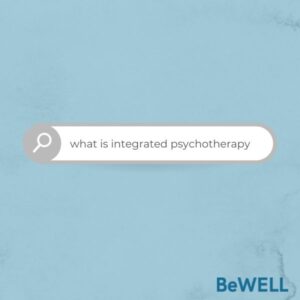The discussion of race can be a slippery one that often gets ignored, even in the mental health field, but culture, ethnicity, and race all play a major role in our lives. It shapes the way we experience the world around us, and helps us form our understanding of all aspects of our personality, values, belief systems, and identity. While there are many unique racial experiences that differ from individual to individual, there are shared cultural factors that play into mental well being and healing.
“Race makes how you experience the world different and as a therapist, if we don’t acknowledge that, we miss the opportunity to see the client that is sitting in front of us.” Says Be.Well Psychotherapist Vanessa Filmonor. Vanessa says that clients may not always bring up race in a therapy session, which is why it is important for therapists to approach each client openly within their unique cultural context, “It is important to honor the diversity of color, socioeconomic status, ethnicity, religion, gender identity, and culture to truly and respectfully show up for your client.”
Vanessa, a North Western University graduate and Nationally Certified Counselor (NCC) and a Licensed Associate Counselor (LAC), knows how race and ethnicity impacts mental health on a personal level, based on her own unique experience as a Black immigrant. “I was personally in therapy for over a decade before I met with a Black therapist and it changed my life.” Now, Vanessa specializes in counseling individuals who have experienced trauma, and suffer from depression and anxiety. She is passionate about helping people of color navigate their experiences and find a path to healing within the context of their own unique cultural identity.
Racial Disparity in Mental Health
According to the American Psychological Association (APA), only 4% of therapists are BIPOC, and historically the mental health community has made mistakes when it comes to caring for Black and Brown individuals. Things like misdiagnosis, involuntary medication, and racist microaggressions are all ways that the mental health care community has failed Black and Brown people. As a whole, the healthcare system in this country has historically been dishonest and even brutal toward the BIPOC community, so there is a lot of mistrust in the system. While the BIPOC experience varies from person to person, part of that shared experience is racism and the trauma that racism has and continues to cause to the BIPOC community. “We have to talk about race because ‘The System’ has made it so and white therapists have done harm to the (BIPOC) population.” Says Filmonor. In fact, one recent study showed over 80% of individuals reported having experienced at least 1 racial microaggression in a counseling session, which could include ignoring or denying race as a factor in mental health altogether.
Vanessa, like many other therapists at Be.Well understand that trust is the most crucial part of a successful relationship with your therapist and are able to show up for their clients in a safe non judgemental way, especially when it comes to race, ethnicity, and culture. Filmonor points out that race is extremely important for therapists to acknowledge before they make a diagnosis and during treatment of a patient. For example, racism causes trauma, so a client may be suffering from PTSD symptoms and could be misdiagnosed if their race or cultural experience and subsequent trauma is overlooked or ignored by their therapist.
Barriers for BIPOC Communities
There are many cultural barriers that can exist in BIPOC communities when it comes to caring for mental health. Shame, stigma, and negative thoughts about mental health still persist with the BIPOC community and according to the National Alliance on Mental Health, 63% of Black men and women see mental illness as a personal weakness. It is no wonder that Black and Brown individuals are less likely to seek care for mental health, even though over 7 million Black individuals reported struggling with mental health issues, according to the 2019 Census Bureau.
In addition to the barrier of shame and stigma, the BIPOC community is disproportionately affected by socioeconomic factors that often make access to healthcare difficult. Therapy can be expensive and often falls at the bottom of the list of people’s priorities, especially those without health insurance.
It can be incredibly difficult to discuss mental health, which is why finding a therapist who understands how culture, race, and even religion plays into your mental well being is crucial. Many BIPOC individuals may choose to express mental health struggles within a religious context, because of its accessibility and the role the church and clergy play in their lives. Vanessa urges her clients to include religion in her sessions if that is a part of their identity, but points out that members of the church are not qualified to give mental health advice. “An example would be a woman suffering from domestic violence. Her clergy leader may offer her an ear to listen and pray with her, but is not qualified to put a plan in place to get her into a safe physical and mental place. And you cannot simply pray your trauma away.” she says.
Having a Black therapist, or one who understands religion and culture can help a client protect themselves while still honoring their traditions and cultural identity. Finding the right therapist can take some time, so it is important to keep an open mind and give your therapist a chance to meet you where you are, which includes being open about your racial and ethnic identity and being willing to ask your therapist questions about how they deal with racial issues.
Finding the Right Therapist
Therapy is a very vulnerable relationship, so finding someone to connect with may take some time. It is important that you feel safe sharing yourself with your therapist and can trust them with the most intimate parts of yourself. Finding that person can be a long and tedious process, especially when you factor in race and racial identity, but taking the time to go through that process will allow you to be your authentic self in your sessions, and allow you to get the care you need to be the healthiest version of yourself.
If you are struggling with racial trauma, stress, or anxiety and depression symptoms, you are not alone and a Be.WELL. Therapist is here to help. Our diverse team of therapists in Hoboken and Manhattan are experienced and empathetic toward race, culture, and identity, and can help navigate your experience and take control of your mental health and well being. Our therapy office understands the importance of feeling safe and can offer you a therapist who allows you to show up as your authentic self. A Be.WELL. Therapist is available in Midtown, NYC and Hoboken NJ, both in person and virtually.



